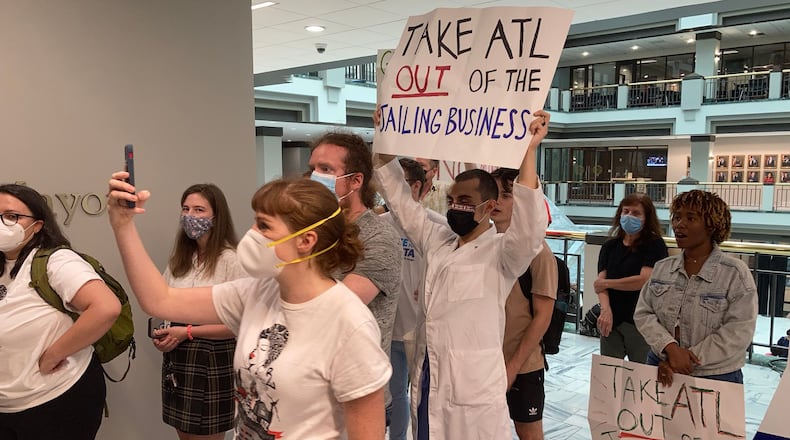The Atlanta City Council chambers were packed. Protesters chanted outside the mayor’s office. Rappers 2 Chainz and Killer Mike were on hand to provide public comment.
Last Monday’s council meeting brought a pre-pandemic level of action and buzz to City Hall as residents, activists, business owners and officials discussed two longstanding issues that both surround a central question: What defines true public safety?
An ordinance that would strengthen the city’s nuisance code and allow officials to close businesses deemed a “nuisance” at least twice in two years sparked discussions — and protests — over whether it would be used to unfairly target local, Black-owned bars and clubs. The proposal was ultimately sent back to committee, though chief sponsor Councilman Dustin Hillis said “blatant lies and misrepresentation” were behind the criticism.
And officials announced a newly negotiated agreement between the city and Fulton County that would allow the county sheriff to house up to 700 inmates in Atlanta’s mostly empty detention center to help alleviate overcrowding at Fulton’s jail.
Neither of these are necessarily new issues.
The city’s push-and-pull relationship with its nightlife sector related to public safety goes back decades. Activists have long been advocating for closure of the city’s detention center, especially after a task force recommended it be demolished.
A major difference this time around, of course, is the new mayoral administration.
On the nightlife issue, Mayor Andre Dickens started a new nightlife division within the mayor’s office in the hopes of giving more resources to bars and clubs.
Credit: HYOSUB SHIN / AJC
Credit: HYOSUB SHIN / AJC
He was also open to negotiations with Fulton County Sheriff Patrick Labat, while former Mayor Keisha Lance Bottoms called it “perplexing” when the sheriff asked for 500 city detention center beds last year. (Activists were quick to point out that Dickens sponsored a resolution back in 2019 in support of repurposing the facility.)
Last week made it clear that these conversations determining the city’s approach on public safety are complicated, messy, and aren’t going away.
Both measures were expected to come before the council’s public safety committee Monday afternoon.
---
Cabinet watch: Mayor Dickens continues to gradually fill crucial positions leading departments he hopes to reform.
The mayor’s office announced last week that Tarlesha Smith will replace Jeffrey Norman as commissioner for the Department of Human Resources. Norman will continue to serve in the city’s law department.
Smith recently served as Assistant City Manager and Human Resources Director for the City of Fort Lauderdale, Fla.
In the Parks and Recreation Department, new commissioner Justin Cutler began serving in his role last week. And new procurement commissioner Jaideep Majumdar started shortly before that.
Dickens is still searching for permanent leaders for the planning and transportation departments.
---
Credit: HYOSUB SHIN / AJC
Credit: HYOSUB SHIN / AJC
Speaking of the procurement department, our story last week on the Cheshire Bridge Road repair project shined a light on how contracting delays at City Hall lead to frustration from local residents and businesses. It’s been a year since a fire damaged a bridge, forcing its demolition and cutting off the two ends of Cheshire Bridge.
Stakeholders in the area feel the city’s procurement department should have moved faster to secure a contractor to rebuild the bridge.
Councilman Alex Wan, who represents the area, summed up the mood in the community as “general frustration, disappointment, not understanding why this has taken so long.”
Our columnist Bill Torpy’s take? “Maybe for the time being we should just call it Cheshire Gap Road.”
---
Credit: City of Atlanta
Credit: City of Atlanta
Mayor Dickens has signed off on a $300,000 donation to the National Network of Abortion Funds, in the hopes of offsetting the impact of Georgia’s abortion law that recently went into effect.
The organization helps women get the support and money they need for abortions, including out-of-state travel.
The mayor’s office also announced the creation of a new cross-functional “reproductive rights team” within the city’s Office of Equity, Diversity and Inclusion, tasked with exploring ways the city can support Atlanta residents in need of access to reproductive health care.
Keep Reading
The Latest
Featured






